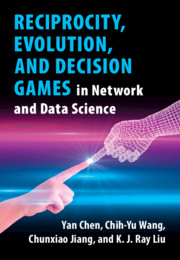Book contents
- Frontmatter
- Contents
- Preface
- 1 Basic Game Theory
- Part I Indirect Reciprocity
- 2 Indirect Reciprocity Game in Cognitive Networks
- 3 Indirect Reciprocity Game for Dynamic Channel Access
- 4 Multiuser Indirect Reciprocity Game for Cooperative Communications
- 5 Indirect Reciprocity Data Fusion Game and Application to Cooperative Spectrum Sensing
- Part II Evolutionary Games
- Part III Sequential Decision-Making
- Index
5 - Indirect Reciprocity Data Fusion Game and Application to Cooperative Spectrum Sensing
from Part I - Indirect Reciprocity
Published online by Cambridge University Press: 01 July 2021
- Frontmatter
- Contents
- Preface
- 1 Basic Game Theory
- Part I Indirect Reciprocity
- 2 Indirect Reciprocity Game in Cognitive Networks
- 3 Indirect Reciprocity Game for Dynamic Channel Access
- 4 Multiuser Indirect Reciprocity Game for Cooperative Communications
- 5 Indirect Reciprocity Data Fusion Game and Application to Cooperative Spectrum Sensing
- Part II Evolutionary Games
- Part III Sequential Decision-Making
- Index
Summary
Data sharing is a critical step in implementing data fusion, and how to encourage sensors to share their data is an important issue. In this chapter, we discuss a reputation-based incentive framework where the data-sharing stimulation problem is modeled as an indirect reciprocity game. In this game, sensors choose how to report their results to the fusion center and gain reputation, based on which they can obtain certain benefits in the future. Taking the sensing and fusion accuracy into account, reputation distribution is introduced into the game, where we prove theoretically the Nash equilibrium of the game and its uniqueness. Furthermore, we apply the scheme to cooperative spectrum sensing. We show that, within an appropriate cost-to-gain ratio, the optimal strategy for the secondary users is to report when the average received energy is above a given threshold and to keep silent otherwise. Such an optimal strategy is also proved to be a desirable evolutionarily stable strategy.
Keywords
Information
- Type
- Chapter
- Information
- Publisher: Cambridge University PressPrint publication year: 2021
